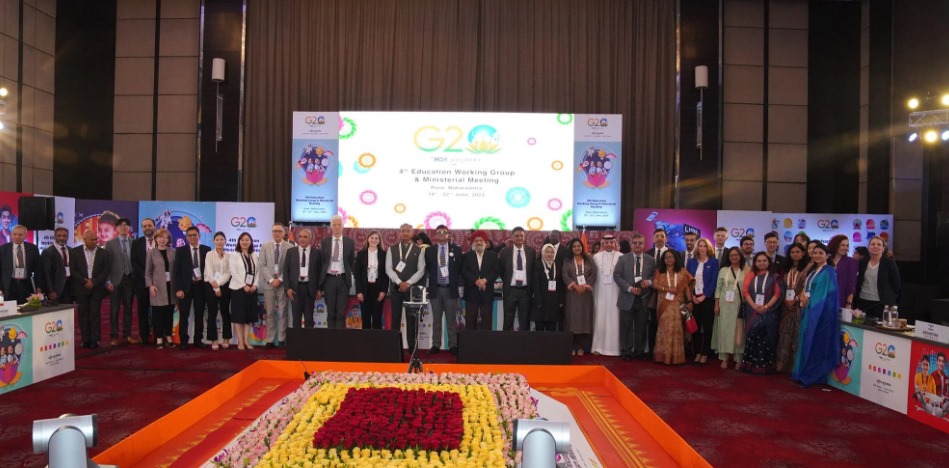In June 2023, Pune, Maharashtra, hosted the G20 Education Ministers‘ Meeting (EMM). Over 150 people attended the meeting, including 14 ministers from G20 members and guest nations, and it was presided over by the Indian Minister of Education, Shri Dharmendra Pradhan. High-level participation from the G20 and Guest nations highlighted the importance of education as a transformative means of achieving the presidency’s vision of “One earth, One family, One future” on a global scale.
What is G20?
The G20, sometimes known as the Group of 20, is an intergovernmental organization made up of 19 independent nations, the European Union, and the African Union. By focusing on concerns like international financial stability, reducing greenhouse gas emissions, and promoting sustainable development, it attempts to address important global economic issues.
Around 80% of the gross world product (GWP),75% of global trade, two-thirds of the world’s population, and 60% of its land area are represented by the G20, which is made up of the finance ministries of the majority of the world’s largest economies, including both developed and industrialized nations.
In 1999, the G20 was established in response to various global economic problems. Since 2008, it has met at least once annually, with summits attended by the heads of state or government, the finance ministers, the foreign ministers, and other top officials from each member; the European Union is represented by the European Commission and the European Central Bank.
G20 Members

Argentina, Australia, Brazil, Canada, China, France, Germany, India, Indonesia, Italy, Japan, the Republic of Korea, Mexico, Russia, Saudi Arabia, South Africa, Türkiye, the United Kingdom, and the United States make up 19 of the Group of Twenty (G20), along with the European Union. The G20 members account for nearly two-thirds of the world’s population, over 75% of global trade, and 85% of the world’s GDP.
How G20 Functions?
The G-20 has no permanent headquarters, and each year, the secretariat rotates between the nations that host or hold the group’s presidency. India, along with Russia, South Africa, and Turkey, are members of Group 2, one of five groups that are formed.
The G-20 agenda, which still significantly relies on the direction of Finance Ministers and central governors, is finalized by a special system of “Sherpas,” or special envoys of G-20 presidents. The ‘Troika’ meetings, which include the nations that have presided over the G-20 in the previous, current, and next years, are another aspect of the G-20. The Troika now consists of India, Indonesia, and Italy.
G20 Education Ministers’ Meeting
The Education Working Group was established in 2018 during Argentina’s G20 Presidency to address skills for life and work and financing of education.
The four priorities identified by the Indian Presidency for the Education Working Group received the full support and adoption of all G20 members, who reached an agreement on all technical issues and supported the adoption of an “Outcome Document and Chair’s Summary” during the meeting.
The Group of 20 Ministers also unanimously approved the G20 Education Working Group Report and Compendium on Education Policies and Programs in G20 Countries.
The five key takeaways from the G20 Educational Ministerial Meeting 2023
- The importance of education in enabling human dignity and empowerment around the world was acknowledged by all Group of 20 members.
- A robust, equitable, inclusive, and sustainable future must be achieved via collaboration, according to all G20 members.
- Everyone in the G20 agreed that it is important to make sure that everyone has access to high-quality, inclusive, and equitable education and training, regardless of their age, gender, socioeconomic status, or cultural background, or whether they have special needs or physical, mental, or other learning challenges.
- The G20 members all agreed that education should focus on building life skills as well as academic knowledge in order to prepare students for the future. They emphasized the importance of lifelong learning as well.
- The Group acknowledged the significant contributions that digital changes, development driven by women, the green transition, and education for sustainable development and lifestyles (LiFE) can provide as accelerators for the SDGs
Important Discussion held in the Meeting

All G20 members agreed, during the discussions at the ministerial meeting, that immediate and collective action is required to ensure that all students acquire the fundamentals of knowledge. This will help to significantly lower the percentage of children, particularly girls and children with disabilities, who are unable to read, comprehend, and complete simple math problems by the year 2030.
All of the ministers reaffirmed their shared commitment to breaking down technological infrastructure barriers and working together to create technology ecosystems and easily accessible, reasonably priced learning resources, including those in local languages, in order to close the digital divide for all students.
Each member of the Group of 20 emphasized the crucial role that educators play in advancing education around the world. They also emphasized the need to create an environment that will support educators in excelling in their careers, especially through capacity building and exchange programs.
The G20 members all agreed on the significance of financial support for human capital development and the encouragement of cooperative ideas and innovations to promote quality teaching, learning, and skilling as well as to foster academic partnerships between educational institutions through joint programs, dual degrees, as well as student and faculty exchange programs.
Conclusion
The Group of 20, representing a significant portion of the world’s population and economy, unanimously emphasised the value of inclusive, equitable, and sustainable education for all. They recognised the need for lifelong learning, blending life skills with academic knowledge, and the transformative potential of digital advancements and sustainable development.
The ministers pledged collective action to ensure universal access to fundamental knowledge and support for educators. This meeting reinforced education’s central role in addressing global challenges and advancing the SDGs, marking a commitment to a brighter, more equitable future.





